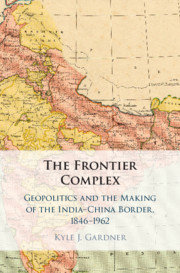Book contents
- The Frontier Complex
- The Frontier Complex
- Copyright page
- Dedication
- Contents
- Figures
- Maps
- Tables
- Additional material
- Preface
- Acknowledgments
- A Note on the Text
- Introduction
- 1 Territory before Borderlines
- 2 Surveys
- 3 Communication
- 4 Reading the Border
- 5 Trans-frontier Men
- 6 The Birth of Geopolitics
- 7 Lines of Control
- Epilogue
- Archives
- Bibliography
- Index
3 - Communication
Roads, Regulation, and the British Joint Commissioners
Published online by Cambridge University Press: 21 January 2021
- The Frontier Complex
- The Frontier Complex
- Copyright page
- Dedication
- Contents
- Figures
- Maps
- Tables
- Additional material
- Preface
- Acknowledgments
- A Note on the Text
- Introduction
- 1 Territory before Borderlines
- 2 Surveys
- 3 Communication
- 4 Reading the Border
- 5 Trans-frontier Men
- 6 The Birth of Geopolitics
- 7 Lines of Control
- Epilogue
- Archives
- Bibliography
- Index
Summary
The third chapter examines the sharp rise of security concerns in the late nineteenth century and the changing role of roads: from conduits of trade to instruments of imperial security. In particular, it focuses on the two central examples of road building in the northwestern Himalaya: the Hindustan-Tibet Road and the Leh-Yarkand Treaty Road. Roads, I show, were conduits that became synonymous with communication. By examining the vast and detailed journals kept by the British Joint Commissioners stationed in Ladakh, beginning in 1870, I reveal how commercial potential beyond the frontier eventually led to the paradoxical desire to “close” the frontier in order to better secure it. As the commissioners were responsible for supervising the Indo-Yarkand and Indo-Tibetan trade routes, their primary tasks were to regulate the movement of people on these routes and to ensure the roads were in good working order. But they were also concerned with gathering intelligence from Central Asia and Tibet. Here we see the interplay of technology, commercial expansion, and security and the limits placed on each by the Himalayan environment. Road building, I show, became a central piece of the larger complex of border making.
Keywords
- Type
- Chapter
- Information
- The Frontier ComplexGeopolitics and the Making of the India-China Border, 1846–1962, pp. 92 - 132Publisher: Cambridge University PressPrint publication year: 2021

